中国人也可过洋节
- 格式:doc
- 大小:14.00 KB
- 文档页数:2
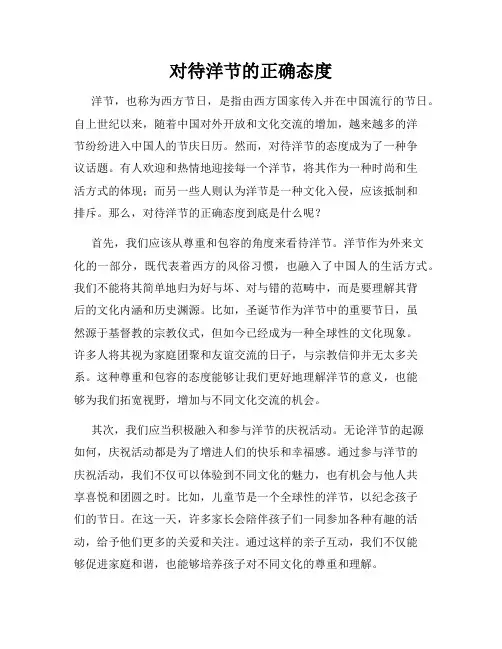
对待洋节的正确态度洋节,也称为西方节日,是指由西方国家传入并在中国流行的节日。
自上世纪以来,随着中国对外开放和文化交流的增加,越来越多的洋节纷纷进入中国人的节庆日历。
然而,对待洋节的态度成为了一种争议话题。
有人欢迎和热情地迎接每一个洋节,将其作为一种时尚和生活方式的体现;而另一些人则认为洋节是一种文化入侵,应该抵制和排斥。
那么,对待洋节的正确态度到底是什么呢?首先,我们应该从尊重和包容的角度来看待洋节。
洋节作为外来文化的一部分,既代表着西方的风俗习惯,也融入了中国人的生活方式。
我们不能将其简单地归为好与坏、对与错的范畴中,而是要理解其背后的文化内涵和历史渊源。
比如,圣诞节作为洋节中的重要节日,虽然源于基督教的宗教仪式,但如今已经成为一种全球性的文化现象。
许多人将其视为家庭团聚和友谊交流的日子,与宗教信仰并无太多关系。
这种尊重和包容的态度能够让我们更好地理解洋节的意义,也能够为我们拓宽视野,增加与不同文化交流的机会。
其次,我们应当积极融入和参与洋节的庆祝活动。
无论洋节的起源如何,庆祝活动都是为了增进人们的快乐和幸福感。
通过参与洋节的庆祝活动,我们不仅可以体验到不同文化的魅力,也有机会与他人共享喜悦和团圆之时。
比如,儿童节是一个全球性的洋节,以纪念孩子们的节日。
在这一天,许多家长会陪伴孩子们一同参加各种有趣的活动,给予他们更多的关爱和关注。
通过这样的亲子互动,我们不仅能够促进家庭和谐,也能够培养孩子对不同文化的尊重和理解。
再次,我们要通过洋节的庆祝活动来传承和弘扬中国传统文化。
洋节的到来,不应该成为人们丧失传统文化的借口,而是应该成为一个展示和传播中国文化的机会。
比如,春节是中国传统的农历新年,是家庭团圆和亲情相聚的时刻。
然而,随着洋节的流行,春节在一些地方逐渐失去了原有的氛围和庆祝方式。
我们可以借助洋节的庆祝活动,将中国传统的文化元素融入其中。
比如,在圣诞节期间,可以制作中国风格的圣诞装饰品,讲述中国的传统故事,以此来传承和弘扬中国文化。
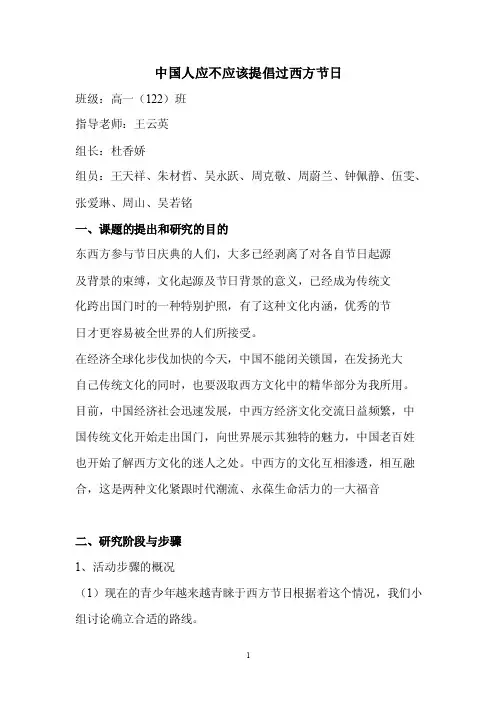
中国人应不应该提倡过西方节日班级:高一(122)班指导老师:王云英组长:杜香娇组员:王天祥、朱材哲、吴永跃、周克敬、周蔚兰、钟佩静、伍雯、张爱琳、周山、吴若铭一、课题的提出和研究的目的东西方参与节日庆典的人们,大多已经剥离了对各自节日起源及背景的束缚,文化起源及节日背景的意义,已经成为传统文化跨出国门时的一种特别护照,有了这种文化内涵,优秀的节日才更容易被全世界的人们所接受。
在经济全球化步伐加快的今天,中国不能闭关锁国,在发扬光大自己传统文化的同时,也要汲取西方文化中的精华部分为我所用。
目前,中国经济社会迅速发展,中西方经济文化交流日益频繁,中国传统文化开始走出国门,向世界展示其独特的魅力,中国老百姓也开始了解西方文化的迷人之处。
中西方的文化互相渗透,相互融合,这是两种文化紧跟时代潮流、永葆生命活力的一大福音二、研究阶段与步骤1、活动步骤的概况(1)现在的青少年越来越青睐于西方节日根据着这个情况,我们小组讨论确立合适的路线。
(2)按照研究路线确立研究重点,上网搜索有关资料进行分析。
(3)以问卷调查的方式去了解人们平时喜欢的西方节日。
2详细的任务调查和分工第一阶段具体活动时间2009年10月23日―1月23日,通过杜香娇、周蔚兰、吴若铭、吴永跃、查找资料,进行讨论,再对一些学生进行采访,记录下来。
对收集的资料和问卷调查进行整理。
第二阶段具体活动时间2009年11月25日―11月26日,在这个阶段中,我们必须采取合作的方式,针对我们手头的相关资料,对课题的疑惑提出自己的看法和观点,在朱材哲、王天祥、伍雯、深入调查,再由杜香娇、钟佩静、周克敬、再次采访,再由周山、张爱琳编写调查问卷进行整理。
第三阶段具体活动时间2010年2月―5月,经过大家共同努力,资料总结出来以后组员们进行交流和讨论。
对所拥有的资料进行分析达成共识后,再由杜香娇对资料进行整理写出报告。
3.计划访问的人群及简单的计划。
学校:学生和老师。
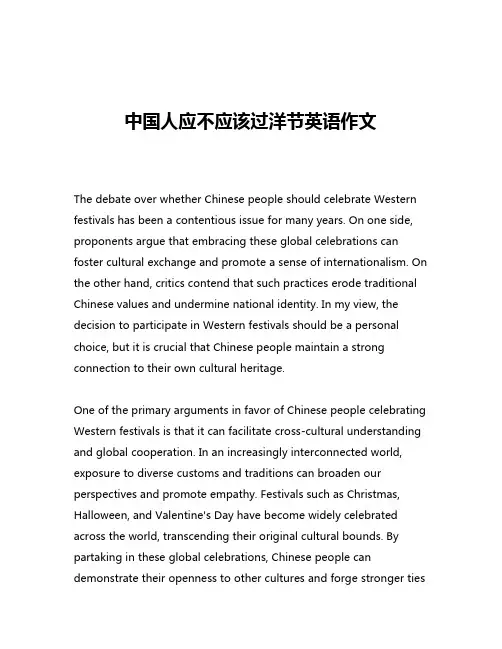
中国人应不应该过洋节英语作文The debate over whether Chinese people should celebrate Western festivals has been a contentious issue for many years. On one side, proponents argue that embracing these global celebrations can foster cultural exchange and promote a sense of internationalism. On the other hand, critics contend that such practices erode traditional Chinese values and undermine national identity. In my view, the decision to participate in Western festivals should be a personal choice, but it is crucial that Chinese people maintain a strong connection to their own cultural heritage.One of the primary arguments in favor of Chinese people celebrating Western festivals is that it can facilitate cross-cultural understanding and global cooperation. In an increasingly interconnected world, exposure to diverse customs and traditions can broaden our perspectives and promote empathy. Festivals such as Christmas, Halloween, and Valentine's Day have become widely celebrated across the world, transcending their original cultural bounds. By partaking in these global celebrations, Chinese people can demonstrate their openness to other cultures and forge stronger tieswith the international community.Moreover, the adoption of Western festivals can be viewed as a natural consequence of globalization and the exchange of ideas. As China has become more integrated into the global economy and political landscape, its citizens have been increasingly exposed to foreign influences. The embrace of these Western traditions can be seen as a reflection of China's growing cosmopolitan outlook and its desire to participate in the global cultural discourse. By selectively incorporating elements of Western festivals into their own celebrations, Chinese people can demonstrate their ability to adapt and evolve while still preserving their core cultural identity.However, critics of this practice argue that the celebration of Western festivals by Chinese people undermines traditional Chinese values and erodes national identity. They contend that the uncritical adoption of these foreign customs can lead to the displacement of cherished Chinese traditions and the dilution of cultural authenticity. For instance, the commercialization and widespread celebration of Christmas in China has been criticized for overshadowing the significance of the Lunar New Year, a deeply rooted and culturally significant event in the Chinese calendar.Furthermore, opponents argue that the celebration of Western festivals can be perceived as a form of cultural imperialism, wherethe dominant Western cultures exert their influence and displace local traditions. They contend that by embracing these foreign celebrations, Chinese people are inadvertently contributing to the homogenization of global culture and the marginalization of their own cultural heritage. This concern is particularly salient in a country like China, which has a rich and diverse cultural legacy that has endured for thousands of years.In my view, the decision to participate in Western festivals should be a personal choice, but it is crucial that Chinese people maintain a strong connection to their own cultural heritage. While embracing elements of global culture can be beneficial in fostering cross-cultural understanding and adaptability, it should not come at the expense of neglecting or devaluing traditional Chinese practices.One possible compromise could be the selective and mindful incorporation of Western festival elements into existing Chinese celebrations. For instance, Chinese people could incorporate the gift-giving traditions of Christmas into the Lunar New Year festivities, or blend the spirit of Halloween with the Qingming Festival, which honors ancestors. In this way, Chinese people can engage with global cultural trends while still preserving the core essence of their own traditions.Additionally, it is essential that Chinese educational institutions andmedia outlets prioritize the teaching and promotion of traditional Chinese culture. By ensuring that future generations are well-versed in their cultural heritage, they can develop a strong sense of identity and pride, which can serve as a foundation for their engagement with global cultures.In conclusion, the debate over whether Chinese people should celebrate Western festivals is a complex issue that involves considerations of cultural exchange, national identity, and personal choice. While the embrace of global cultural trends can be beneficial, it is crucial that Chinese people maintain a strong connection to their own rich and diverse cultural legacy. By striking a balance between the adoption of Western festival elements and the preservation of traditional Chinese practices, Chinese people can navigate the challenges of globalization while remaining true to their cultural roots.。
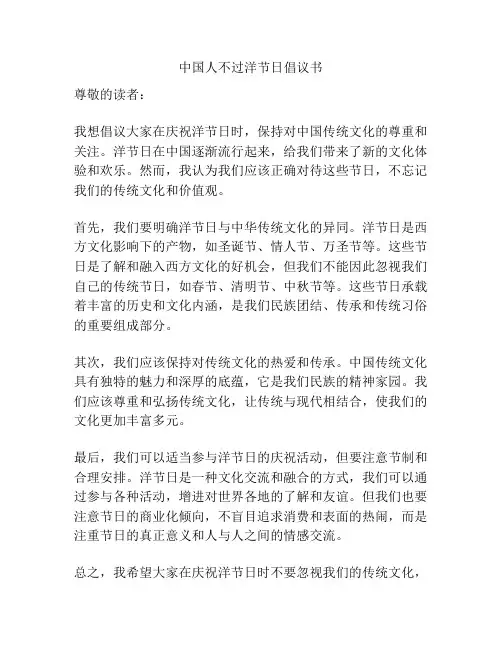
中国人不过洋节日倡议书
尊敬的读者:
我想倡议大家在庆祝洋节日时,保持对中国传统文化的尊重和关注。
洋节日在中国逐渐流行起来,给我们带来了新的文化体验和欢乐。
然而,我认为我们应该正确对待这些节日,不忘记我们的传统文化和价值观。
首先,我们要明确洋节日与中华传统文化的异同。
洋节日是西方文化影响下的产物,如圣诞节、情人节、万圣节等。
这些节日是了解和融入西方文化的好机会,但我们不能因此忽视我们自己的传统节日,如春节、清明节、中秋节等。
这些节日承载着丰富的历史和文化内涵,是我们民族团结、传承和传统习俗的重要组成部分。
其次,我们应该保持对传统文化的热爱和传承。
中国传统文化具有独特的魅力和深厚的底蕴,它是我们民族的精神家园。
我们应该尊重和弘扬传统文化,让传统与现代相结合,使我们的文化更加丰富多元。
最后,我们可以适当参与洋节日的庆祝活动,但要注意节制和合理安排。
洋节日是一种文化交流和融合的方式,我们可以通过参与各种活动,增进对世界各地的了解和友谊。
但我们也要注意节日的商业化倾向,不盲目追求消费和表面的热闹,而是注重节日的真正意义和人与人之间的情感交流。
总之,我希望大家在庆祝洋节日时不要忽视我们的传统文化,
并通过传承和发扬传统文化来塑造我们民族的独特精神。
让洋节日成为了解世界的窗口,也让我们的传统文化在新的时代焕发出更加耀眼的光芒。
谢谢大家的支持和理解!
此致
敬礼。

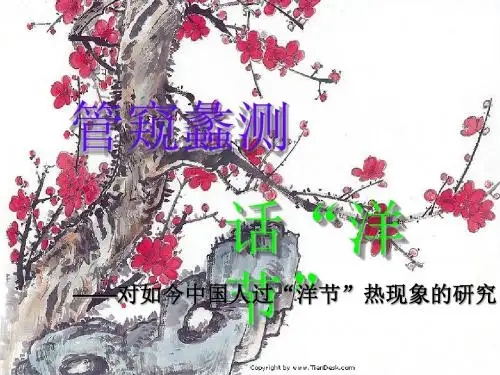
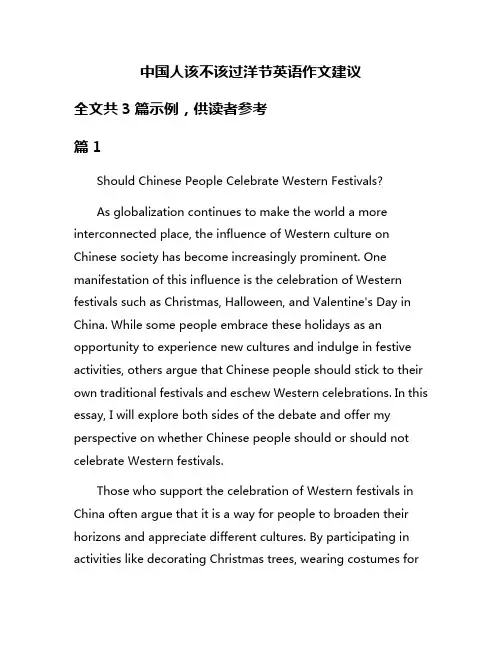
中国人该不该过洋节英语作文建议全文共3篇示例,供读者参考篇1Should Chinese People Celebrate Western Festivals?As globalization continues to make the world a more interconnected place, the influence of Western culture on Chinese society has become increasingly prominent. One manifestation of this influence is the celebration of Western festivals such as Christmas, Halloween, and Valentine's Day in China. While some people embrace these holidays as an opportunity to experience new cultures and indulge in festive activities, others argue that Chinese people should stick to their own traditional festivals and eschew Western celebrations. In this essay, I will explore both sides of the debate and offer my perspective on whether Chinese people should or should not celebrate Western festivals.Those who support the celebration of Western festivals in China often argue that it is a way for people to broaden their horizons and appreciate different cultures. By participating in activities like decorating Christmas trees, wearing costumes forHalloween, and exchanging gifts on Valentine's Day, Chinese people can gain a better understanding of Western customs and traditions. These celebrations also provide an opportunity for people to bond with family and friends, as they come together to enjoy the festive atmosphere and create lasting memories.Furthermore, the commercial aspect of Western festivals has made them increasingly popular in China. Retailers and businesses have capitalized on the opportunity to market products and services related to these holidays, leading to a surge in consumer spending during peak shopping seasons. As a result, many people view Western festivals as a chance to shop for gifts and enjoy discounts and promotions offered by retailers.On the other hand, critics of the celebration of Western festivals in China argue that it undermines the importance of traditional Chinese culture and values. They believe that by adopting Western holidays, Chinese people are neglecting their own rich heritage and customs. Moreover, some argue that Western festivals are commercialized and lack the historical and cultural significance of traditional Chinese festivals, such as the Lunar New Year and Mid-Autumn Festival.In addition, there are concerns about the impact of Western festivals on Chinese social norms and values. For example,Halloween, with its emphasis on dressing up in costumes and engaging in spooky activities, has been criticized for promoting a culture of superficiality and materialism. Similarly, Valentine's Day, with its focus on romantic love and gift-giving, has been criticized for fostering consumerism and pressure to conform to societal expectations.In conclusion, the debate over whether Chinese people should celebrate Western festivals is complex and nuanced. While there are valid arguments on both sides of the issue, I believe that it is ultimately up to individuals to decide how they want to celebrate holidays and festivals. Whether one chooses to embrace Western traditions or adhere to traditional Chinese customs, the most important thing is to celebrate with joy and appreciation for the cultural diversity that makes the world a vibrant and fascinating place. Ultimately, the key is to strike a balance between honoring one's own heritage and being open to new experiences and perspectives.篇2Should Chinese People Celebrate Western Holidays?In recent years, there has been a growing trend in China to celebrate Western holidays such as Christmas, Valentine's Day,and Halloween. While some people see this as a fun and festive way to embrace other cultures, others argue that Chinese people should stick to their traditional holidays and customs. So, the question arises: should Chinese people celebrate Western holidays?There are several arguments in favor of celebrating Western holidays. Firstly, it can be a way for Chinese people to learn about and appreciate different cultures. By participating in Western holidays, they can gain a better understanding of the traditions and customs of other countries. This can help to foster cultural exchange and promote diversity.Secondly, celebrating Western holidays can also bring people together and create a sense of community. For example, Christmas is often seen as a time for families and friends to come together, exchange gifts, and enjoy each other's company. By participating in these celebrations, Chinese people can strengthen their relationships with loved ones and create lasting memories.Furthermore, celebrating Western holidays can also be a way to boost the economy. Many businesses in China now offer special promotions and discounts during Western holidays,which can stimulate consumer spending and drive economic growth. This can benefit both businesses and consumers alike.On the other hand, there are also arguments against celebrating Western holidays. Some people believe that doing so can erode traditional Chinese culture and values. They argue that by adopting Western holidays, Chinese people may lose touch with their own heritage and customs. This can lead to a loss of identity and a sense of disconnection from their cultural roots.Additionally, some critics argue that the commercialization of Western holidays has become excessive. In recent years, there has been a growing trend of businesses promoting Western holidays in China as a way to boost sales. This has led to a commercialization of these holidays, with an emphasis on consumerism rather than cultural significance.In conclusion, the debate over whether Chinese people should celebrate Western holidays is a complex and nuanced one. While there are certainly benefits to embracing other cultures and traditions, it is also important to consider the potential drawbacks. Ultimately, the decision to celebrate Western holidays should be a personal one, based on individual beliefs and values. As long as Chinese people approach theseholidays with an open mind and a sense of respect for other cultures, there is no harm in joining in the festivities.篇3Should Chinese People Celebrate Western Holidays?In recent years, the celebration of Western holidays such as Christmas, Halloween, and Valentine's Day has become increasingly popular in China. While some people embrace these holidays as a way to experience different cultures and traditions, others argue that they are a form of cultural imperialism and erode traditional Chinese values. This has sparked a heated debate about whether Chinese people should continue to celebrate Western holidays.Those in favor of celebrating Western holidays argue that it is a way to broaden one's cultural horizons and connect with the global community. By participating in these holidays, they believe that Chinese people can gain a better understanding of Western cultures and traditions, and develop a more inclusive and open-minded worldview. Furthermore, the celebration of Western holidays can also promote cultural exchange and strengthen diplomatic ties between China and Western countries.On the other hand, opponents of celebrating Western holidays argue that it can lead to the erosion of traditional Chinese values and customs. They argue that the commercialization of Western holidays has overshadowed traditional Chinese festivals and rituals, leading to a loss of cultural identity and heritage. Furthermore, some critics believe that the celebration of Western holidays is a form of cultural imperialism, with Western values and norms dominating over Chinese traditions.In addition, some people believe that the celebration of Western holidays can have negative social and economic impacts. The excessive consumption and commercialization associated with Western holidays can lead to wastefulness and materialism, and put pressure on families and individuals to spend money on unnecessary items. Moreover, the focus on Western holidays can distract from important Chinese festivals and traditions that hold cultural and historical significance.In conclusion, the issue of whether Chinese people should celebrate Western holidays is a complex and nuanced one. While there are valid arguments on both sides of the debate, ultimately, it is up to individuals to decide for themselves whether they want to participate in the celebration of Western holidays. It isimportant to strike a balance between embracing different cultures and traditions while also preserving and promoting traditional Chinese values and customs. Ultimately, the key is to celebrate holidays in a way that is meaningful and respectful to all cultures involved.。
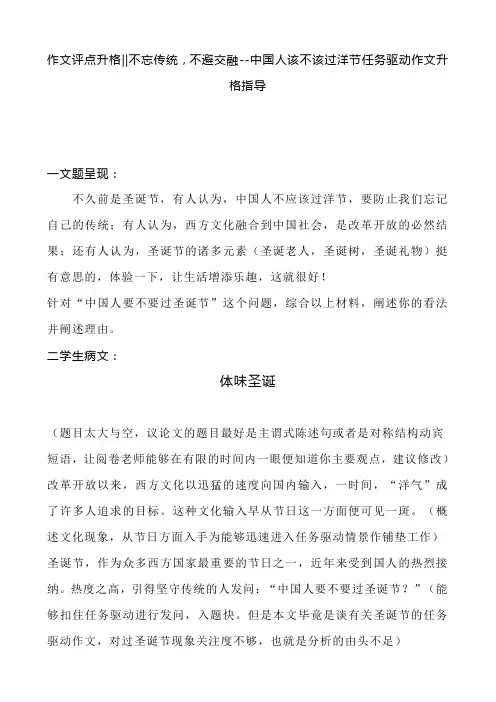
作文评点升格‖不忘传统,不避交融--中国人该不该过洋节任务驱动作文升格指导一文题呈现:不久前是圣诞节,有人认为,中国人不应该过洋节,要防止我们忘记自己的传统;有人认为,西方文化融合到中国社会,是改革开放的必然结果;还有人认为,圣诞节的诸多元素(圣诞老人,圣诞树,圣诞礼物)挺有意思的,体验一下,让生活增添乐趣,这就很好!针对“中国人要不要过圣诞节”这个问题,综合以上材料,阐述你的看法并阐述理由。
二学生病文:体味圣诞(题目太大与空,议论文的题目最好是主谓式陈述句或者是对称结构动宾短语,让阅卷老师能够在有限的时间内一眼便知道你主要观点,建议修改)改革开放以来,西方文化以迅猛的速度向国内输入,一时间,“洋气”成了许多人追求的目标。
这种文化输入早从节日这一方面便可见一斑。
(概述文化现象,从节日方面入手为能够迅速进入任务驱动情景作铺垫工作)圣诞节,作为众多西方国家最重要的节日之一,近年来受到国人的热烈接纳。
热度之高,引得坚守传统的人发问:“中国人要不要过圣诞节?”(能够扣住任务驱动进行发问,入题快。
但是本文毕竟是谈有关圣诞节的任务驱动作文,对过圣诞节现象关注度不够,也就是分析的由头不足)在回答这个问题之前,我们先反观当下的现状。
孩子们津津乐道圣诞老人的故事,却不知过年中的“年”最初是一个妖怪的名字。
人们争相赠送圣诞礼物、贺卡,借此表达情意,却将压岁钱流于形式,忽略其中保佑平安的寓意。
由此可见,西方节日的文化深入人心,而传统文化风俗却遭人忽视、遗忘。
这样下去,过度西化、遗失传统的结果绝不是危言耸听。
(小作者由当下人们热衷“过圣诞节”现象,引出对传统文化这一问题的理性思考)究其本质来看,根源在于人们的文化认同感。
(中心句放在段首,采用总分结构,便于快速阅卷)一方面,是西方文化的过度传播。
(“过度”二字用的非常准确,表明了作者的观点态度)目前社会上的圣诞节活动大多处于商业层次,很少人将其作为以家庭为中心的节日,而更多以购物、聚餐的方式庆祝。

很多人对现今中国社会“洋节”大行其道极为忧虑,特别对年轻人一些“集体无意识”的表现痛心疾首,甚至悲哀地认为这是“中国文化的主位性缺失和主体性沉沦”。
有忧患意识不是坏事,但如果走向极端,就会陷入杞人忧天的泥淖。
如今的年轻人很喜欢圣诞节不假,但他们过的圣诞节早已没了西方圣诞节的宗教信仰色彩,只不过像情人节、光光棍节一样,成为宣泄情感、放松自己的载体罢了。
我过圣诞节,并不是因为信奉了上帝,信奉西方的自我主义。
我乐意过平安夜,因为它是一种美好祝愿的象征,仅此而已。
对待圣诞节,就像对待洋快餐一样,我也会去吃,但是,不会依靠它。
就像洋节日,过了之后就放下了,不会想其他的什么,更不会将其与中国传统文化的冲突联系起来。
不论是中国人还是西方人过节,主旨都是为了体会快乐、幸福,体会亲情、友情、爱情的美好。
面对洋节,我们更应用一份平常心去对待,过分崇洋,并非好事。
现在中国人,尤其是年轻人过洋节日没什么新鲜的了,和我们传统节日比较,大家乐于其中,我想有以下几种原因:1、年轻人的节日、年轻喜欢和年轻人一起,正好洋节日给了我们理由和机会2、洋节日不老套、不必一定回家,大多年轻人在外地工作,回家很麻烦,春运可见一斑3、洋节日新鲜、洋节日给了我们欢快的气氛,而不必受限制,必须打电话给很少见面的亲戚,也不用象老外那样祷告我们自己的节日并非收到冷落,其实正统的节日,我们都很在意,在这里上网的人大多在城市,我们看到的只是中国的一小部分,在农村就没有什么洋节日,春节农村最热闹!对于洋节,我觉得不要一味的否定,客观问题客观分析。
实际上西方的节日还是以人为本,重视的是个人的存在和价值,中国的节日重视集体和家国,多教育的寓意,反映的是我们古老的农业文明的传统。
其次,文化是没有国界的。
世界各民族虽有不同的文化渊源,但某种文化一旦形成,就属于全人类的共同精神财富。
一个优秀的民族首先要懂得吸收外民族的优秀文化。
硬要把他民族创造的先进文化视为异端来排斥,无异于精神上的自戕!四大发明是中国的成果,但现在却被国外运用得炉火纯青。
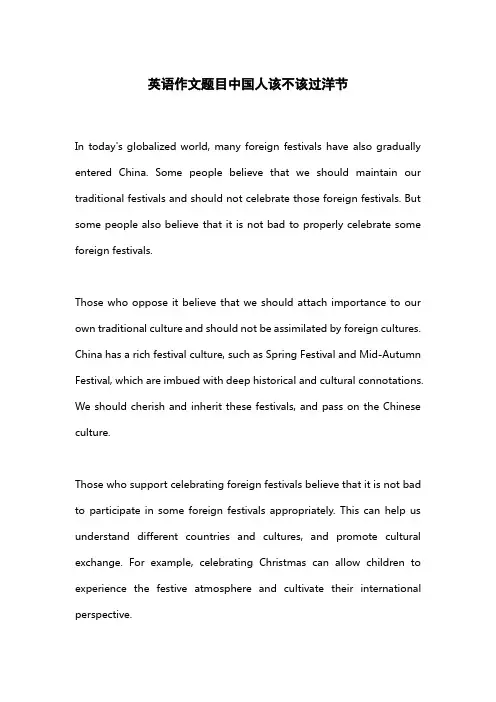
英语作文题目中国人该不该过洋节In today's globalized world, many foreign festivals have also gradually entered China. Some people believe that we should maintain our traditional festivals and should not celebrate those foreign festivals. But some people also believe that it is not bad to properly celebrate some foreign festivals.Those who oppose it believe that we should attach importance to our own traditional culture and should not be assimilated by foreign cultures. China has a rich festival culture, such as Spring Festival and Mid-Autumn Festival, which are imbued with deep historical and cultural connotations. We should cherish and inherit these festivals, and pass on the Chinese culture.Those who support celebrating foreign festivals believe that it is not bad to participate in some foreign festivals appropriately. This can help us understand different countries and cultures, and promote cultural exchange. For example, celebrating Christmas can allow children to experience the festive atmosphere and cultivate their international perspective.In general, there is no standard answer to this question. We need to protect our traditional culture while also integrating with the world, which requires us to find a balance between the two. The key is to respect different cultural traditions and promote cultural exchange and integration.在全球化的今天,许多外来节日也逐渐传入中国。
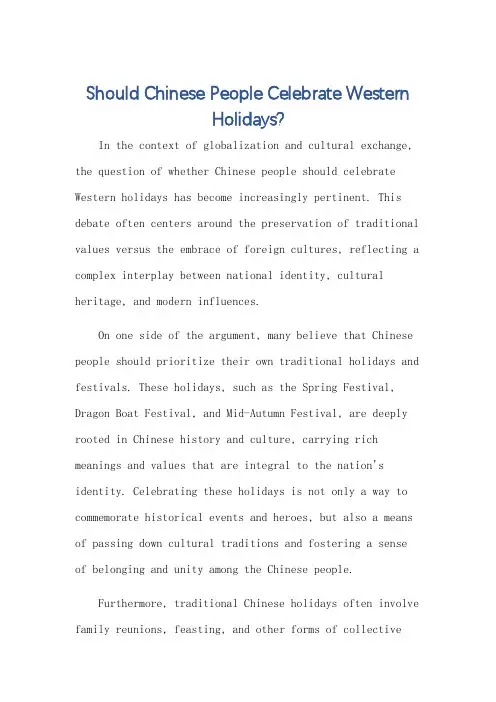
Should Chinese People Celebrate WesternHolidays?In the context of globalization and cultural exchange, the question of whether Chinese people should celebrate Western holidays has become increasingly pertinent. This debate often centers around the preservation of traditional values versus the embrace of foreign cultures, reflecting a complex interplay between national identity, cultural heritage, and modern influences.On one side of the argument, many believe that Chinese people should prioritize their own traditional holidays and festivals. These holidays, such as the Spring Festival, Dragon Boat Festival, and Mid-Autumn Festival, are deeply rooted in Chinese history and culture, carrying rich meanings and values that are integral to the nation's identity. Celebrating these holidays is not only a way to commemorate historical events and heroes, but also a means of passing down cultural traditions and fostering a sense of belonging and unity among the Chinese people.Furthermore, traditional Chinese holidays often involve family reunions, feasting, and other forms of collectivecelebration, promoting strong social bonds and a sense of community. These aspects of Chinese culture are unique and cannot be replicated by Western holidays, which tend to focus more on individualistic pursuits like gift-giving and consumerism.However, the other side of the argument maintains that Chinese people should not be averse to celebrating Western holidays. In today's interconnected world, cultural exchange and diversity are essential for promoting mutual understanding and respect between different cultures. Western holidays, such as Christmas, Valentine's Day, and Thanksgiving, offer Chinese people an opportunity to learn about and appreciate Western cultures, traditions, and values.Moreover, these holidays provide a platform for socializing and having fun, often bringing people together from different backgrounds to share joy and celebration. While these holidays may not carry the same historical and cultural significance as traditional Chinese holidays, they can still be enjoyed as a way to broaden cultural horizons and enrich personal experiences.Of course, it is important to strike a balance between celebrating Western holidays and preserving Chinese traditions. This can be achieved by integrating elements of both cultures into celebrations, or by alternating between celebrating Western and Chinese holidays. For instance, families could choose to celebrate Christmas with a traditional Western meal followed by a Chinese-style fireworks display, or they could combine Valentine's Day with traditional Chinese expressions of love and affection. In conclusion, the question of whether Chinese people should celebrate Western holidays is not a straightforward one. While preserving and promoting traditional Chinese holidays is undoubtedly important for maintaining cultural identity and heritage, embracing Western holidays can also be beneficial in terms of cultural exchange, mutual understanding, and personal enrichment. The key is to find a balance that respects and honors both cultures while allowing individuals to enjoy and celebrate in a way thatis meaningful and enjoyable to them.**中国人是否应该过洋节**在全球化和文化交流的大背景下,中国人是否应该庆祝西方节日的问题日益凸显。
中国人该不该过洋节英语作文建议Should Chinese People Celebrate Western Holidays?In recent years, there has been an increasing trend in China of celebrating Western holidays such as Christmas, Halloween, and Valentine's Day. Some people argue that embracing these holidays can help promote cultural exchange and understanding between China and the West. However, others believe that Chinese people should focus on their own traditional festivals and not adopt foreign holidays. So, the question arises: Should Chinese people celebrate Western holidays?Those in favor of celebrating Western holidays argue that it can be a way to learn about different cultures and traditions. By participating in these celebrations, Chinese people can gain a better understanding of Western customs and values. It can also create opportunities for people from different backgrounds to come together and celebrate together, fostering a sense of unity and inclusivity.Moreover, celebrating Western holidays can also be a way to boost the economy. Many businesses in China have taken advantage of the popularity of Western holidays to sell products and services. For example, during Christmas season, many shopsand restaurants offer special promotions and decorations to attract customers. This can stimulate consumer spending and drive economic growth.On the other hand, opponents argue that Chinese people should prioritize their own traditional festivals and customs. They believe that by focusing on Western holidays, Chinese people are neglecting their own cultural heritage. China has a rich history of festivals such as the Spring Festival, Mid-Autumn Festival, and Dragon Boat Festival, which are deeply ingrained in Chinese culture and should be preserved and cherished.Additionally, some people argue that the commercialization of Western holidays in China has led to the loss of their original meaning and significance. For example, Valentine's Day has become more about buying gifts and flowers rather than expressing love and affection. This commercialization can distract people from the true spirit and values of these holidays.In conclusion, whether Chinese people should celebrate Western holidays is a complex issue with valid arguments on both sides. While embracing Western holidays can promote cultural exchange and unity, it is also important to preserve Chinese traditions and values. Ultimately, it is up to the individual to decide how they want to celebrate holidays and what culturalpractices they want to adopt. As long as the celebration is respectful and meaningful, there is no right or wrong answer. Let us celebrate the diversity of traditions and customs that make our world a rich and vibrant place.。
正方过洋节辩论赛三辩首先,西方文化有助于我们更好的了解世界。
今天,经济全球化已是不可逆转之时代发展大趋势。
各国的政治经济文化交流日益频繁,彼此的影响已愈加深刻。
国际交往中我们需要遵循共同的规则。
而“节日”有助于我们了解彼此的文化背景,增强信任,以更好的实现经济文化等各方面的交口流与合作。
国家间爆发战争往往就是因为彼此的误解所引起的。
中国人特别是年轻一代热衷于过“洋节”并不是什么错误,反而正式适应经济全球化的最佳体现。
而且现在西方也不是正在掀起学习中国文化,过春节的热潮吗?这正是文化交流的结果。
在引进西方节日的基础上,我们能更好的了解西方文化的真实面目,达到知己知彼,从而更好的对外弘扬中华传统文化,让世界了解中国。
其次,提倡西方节日,学习西方文化是中国面向世界,向世界展示中华博大精深的文化的需要。
目前,国内有一些人思想还比较保守,不能很好的适应全球化所带来的变化。
于是为了逃避这些变化,就提出了抵制西方文化的观点,这是不对的,也正是他们狭隘民族主义的体现,我们应批判这种落后保守思想。
如果他们将抵制西方文化的精力放在对外宣传中华文明这方面不是更好吗?然而他们不愿意,所以我们要帮助他们树立起全新的思想观念,为国民造福!最后,提倡西方节日能改我们带来极大的益处。
文化是沟通情感的桥梁。
中国的传统节日在感情表达方面显得比较含蓄,人们内心的情感不一表达出来,而西方的的节日一般比较活泼开放,这有利于人们更好的借助节日表达自己内心的真实情感,弥补我国传统节日在这方面的不足。
提倡西方节日,更注重的是其精神文化内涵,并不意味着要冷落中国的传统节日。
而是要解放中国人的情感表达方式。
“自从引进了感恩节,我们的情感变得更丰富,思想也更开放,也更乐于向爸爸妈妈说声我爱你了。
自从有了圣诞节,我们的活动变得更精彩,心情也更愉快了。
”中国人的情感表达方式得到解放,外国人越来越喜欢过春节。
事实上我们的提倡正起到了宣扬中国文化的目的。
以中国人热衷过洋节为话题文化自信的角度展开论述的作文小朋友们,你们有没有发现,现在越来越多的中国人喜欢过洋节啦,什么圣诞节、情人节,可热闹了。
但是,我们可不能因为喜欢洋节,就忘了咱们自己的传统节日哟!咱们中国的传统节日,那可都是有好多好多故事的。
比如说春节,一家人聚在一起,贴春联、吃饺子、放鞭炮,多开心呀!还有中秋节,大家一起赏月、吃月饼,团团圆圆的。
可是,如果我们总是热衷过洋节,就可能会忽略了咱们自己节日的美好。
就像一个小朋友,如果总是喜欢别人的玩具,却不珍惜自己的宝贝,那多可惜呀!我们要有文化自信,要知道咱们中国的文化是很棒很棒的!要多去了解和喜欢咱们自己的节日,把咱们的传统文化传承下去。
作文二、《洋节虽好,自家节日更妙》小朋友们,今天我想和你们说一说关于过节的事儿。
你们看,现在一到圣诞节、万圣节,街上可热闹啦,到处都是漂亮的装饰。
可是你们知道吗,咱们中国的端午节、重阳节也很有意思呢!端午节的时候,我们会包粽子、赛龙舟,是为了纪念伟大的诗人屈原。
大家一起努力划船,多有劲儿!重阳节呢,我们要尊敬爷爷奶奶,给他们送上祝福。
虽然洋节很有趣,但咱们自己的节日更有意义呀。
它们是咱们祖先留下来的宝贝,我们可不能丢了。
我们要自信地说,咱们中国的节日是最棒的!作文三、《过洋节,别忘本》小朋友们,你们有没有跟着爸爸妈妈过洋节呀?比如说圣诞节,是不是会收到礼物,觉得特别开心?但是呀,我们在开心过洋节的时候,可不能忘了咱们自己国家的节日哟。
就像过年,我们可以穿新衣服,拿红包,多快乐!还有元宵节,能看花灯,猜灯谜。
洋节就像是别人家的糖果,偶尔尝尝是不错,可咱们自家的饭菜才是最养人的。
我们要爱自己的节日,因为那是咱们中国的特色,是咱们的根。
我们要自信地把咱们的节日过得热热闹闹的!作文四、《热爱自家节日,自信满满》小朋友们,你们知道吗?现在有好多人喜欢过洋节,可我觉得咱们中国的节日才是最厉害的!比如说七夕节,那是牛郎织女相会的日子,多浪漫呀!还有清明节,我们去扫墓,纪念祖先,懂得感恩。
我提倡过洋节,虽然我不怎么过,我觉得过洋节有以下好处: ①、有些洋节确实挺有意思的,比如“圣诞节”、“感恩节”什么的,中国人体验一下没什么不好的。
相反,还能促进中国人对外国文化的了解,开阔视野。
②、反正闲着也是闲着,加上中国人现在的日子都好过了,多过几个节日有何不妥?不仅多了几个机会和亲朋好友相聚,还为“大吃大喝”找到了理由,多好呀!③、这都什么年代了,大街上跑的汽车,人们吃、喝、用的东西,包括语言等各个方面不都是“进口”的吗,何况过几个洋节呢?④、有些国家不是也过中国的传统节日吗,像端午节、泼水节什么的,只要外国人感兴趣,人家才不管是哪个国家的呢,只要高兴就行!所以,中国人过洋节也很正常。
⑤、不管是洋的,还是土的,有的节日过就好。
这是全球一体化,东西方文化的融合的一种表现,只要大家接受就好,存在的就是合理的,不存在国人强于或者弱于西方人的问题。
过不过洋节,全凭个人的一种体验,没有经历过,大家体会一下,还是可以的。
⑥、有人说,现代中国正是应该以经济发展为核心,文化传承不是第一位的。
我说,此言差矣。
我认为,一个国家的发展应该是全面的,不是单单地以GDP为社会发展的唯一衡量尺度。
这个可以说现在已经成为我们的共识了。
⑦、如今,我们正在大力提倡科学发展观,如何保护好我们的历史文化资源,让它们为我们的社会发展建设做贡献,是每个官员和文化工作者所要想的,要做的。
只有真正重视起我们的物质文化遗产,屏弃那种单纯的经济观点,才能使我们的文化得以传承,使我们走上全面可持续的发展道路。
据说,我们的春节和端午等传统节日被新加坡等国注册了...⑧、谈不上该不该,现在也有很多老外喜欢过春节看耍狮吃饺子,中秋赏月吃月饼,我们怎么就不能过所谓的“洋节”呢?就当做是文化的共融吧。
⑨、其实,过什么节,什么节日名字无所谓,大家只是想有一个团聚,欢乐、放松的机会,随意说,即使过了圣诞节也不是说崇洋媚外,大家高兴开心就好!这才是最重要的!⑩、我对中国人过洋节的理解是:中国人很聪明,给商人一个赚钱的机会,给自己一个放松的理由,给朋友一个喝酒的借口,给家人一个温馨的感觉。
认真阅读下面的材料,根据自己对材料的感悟和联想,选一个合适的角度写一篇作文
2015年圣诞节来临时,中国内地许多地方的人士用各种不同的形式来"庆祝圣诞",给孩子买圣诞礼物,到饭店聚餐,去教堂参加活动……同样是圣诞节的这一天,长沙某高校学生身着汉服,手举" 抵制圣诞节"等标语,走上长沙太平街圣诞活动现场,呼吁广大市民"中国人不过外国节",过中国传统节日.
要求:题目自拟,立意自定,文体自选(诗歌除外),不得抄袭、套作,不少于800字.
文题解析:
试题分析:这是一则材料作文,本题材料中列举了两种对立的现象,一种是对洋节欢迎而且热衷,一种是抑制,这两种现象目前是中国是常见的,因此考生在写作中不要轻易否定或赞成哪种观点,一定要注意揭示和挖掘以"圣诞节"为代表的"洋节"和"传统节日"所蕴含的内在的文化精神,从中找出合适的点,进行叙述或议论.比如可立意为"珍视传统节日,不必追逐洋节";也可立意为"洋节蕴含的文化东西,值得借鉴";"将中西方文化结合起来"等.从文体上看,本题要求除诗歌外文体不限,考生可以根据自己平时复习的情况选择自己擅长的文体来写,注意记叙文要以情动人,议论文要观点鲜明,论据典型,论证有力.
中国人也可过洋节
中国人应不应该过洋节?一直是激烈讨论和各级近年来人们争论的主题.有人说,现在的西方节日不应该在中国庆祝,因为这样的节日如圣诞节具有强烈的宗教意识和颜色.各有各的说法.在我看来,我觉得中国人应该过洋节.
每个国家都有自己的背景与色彩,这是与它的特殊历史,优秀文化有关的特殊节日.所以,节日是几千年来对一个国家的文化沉积的产品.而我们中国的文化是博大精深的,对于外国文化一向都是取其精华,去其糟粕.又由于全球化,文化交流也是一样,各种各样的文化传进中国.这正是考验我们的时候.不要因为这样保护自己的文化而一味抵制外国文化,例如外国节日一样,我们要勇敢地去吸收.
节日是不同国家的经济,文化交流的结果.可以说,对人类文明的发展进程是相互渗透,相互融合的过程中,期间,一个文化吸收其他文化,每个文化的发展,分别就新的高度.正如毛泽东主席说:"让古为今用与洋为中用."其实,中国一直受到有选择地自改革开放如圣诞节一些外国节,情人节,母亲节和父亲节,已生根发芽在我们国家,成为人民群众的节日活动.一方面是与各种通信和与日新月异日媒体报道,在各个领域的交流日益增多是一天,另一方面是中华民族传统文化和习俗正在采取庆祝节日的多样化.作为一个传统节日,一个典型的东方文化,春节也被庆祝到许多国家去.外国人民享有中国饺子,放鞭炮设置,进行舞狮的表演和参与的各种节庆活动的一部分.在美国和加拿大,不但与邮政发行部门,而且中国的纪念硬币中央银行每年12中的动物邮票.当春节的临近,一些政府领导人参拜拜年的华人在那里通过电视,广播和报纸.各级地方领导人甚至在春节庆祝活动或游行的一部分.在美国一些州,春节,甚至被规定的法律节日.对于我们博大精深的中国,难道不能做到这样吗?
再者,毛泽东同志曾经说过,窗子打开会有新鲜空气,也会有苍蝇蚊子飞进.一个国家也是这样,尤其是我国正处在改革开放的风口浪尖,面临这一系列的挑
战和机遇.文化的发展自然就在其列,批判的继承和加以吸收,一直是我国对外来文化的主导思想,那些洋节中的优秀元素加以吸收是无可非议的.
受了西方文化理念影响的人们在欢天喜地的过着各式洋节的同时,中华民族的传统节日春节、端午节、中秋节,他们也过得热闹非凡.由此可见,中国人多一些畅快抒发心情的洋节有什么不好呢?不是有越来越多的年轻人在走近圣诞节、情人节的同时,也学会了在母亲节、父亲节给亲人献上一份祝福.谁说现代物质文明和精神文明不是相辅相成、多元文化共存的综合体呢?
由上所论,中国人应该过洋节.这是我们民族自信包容的表现也是我们文化的进步.面对这样的全球化,我们无可避免,应当努力迎接,做到最好.让文化更加优秀,包纳百川,融合优秀的外国文化和传统文化,发扬先进的现代文化.。